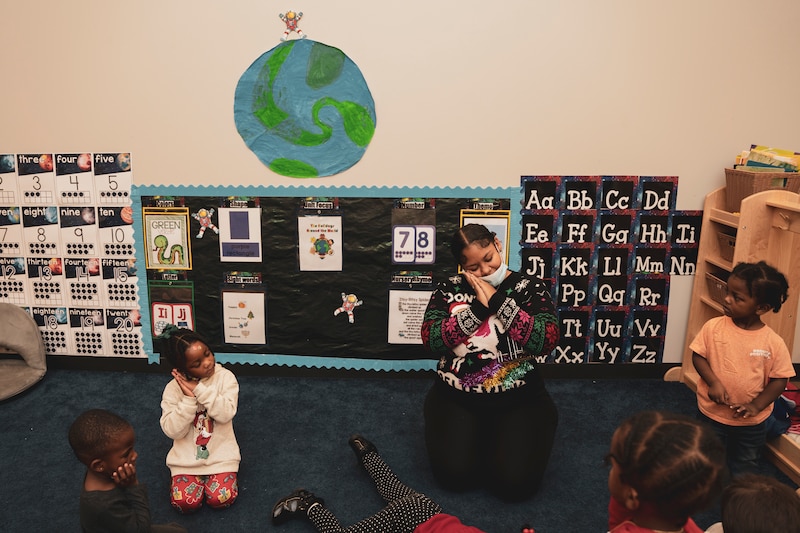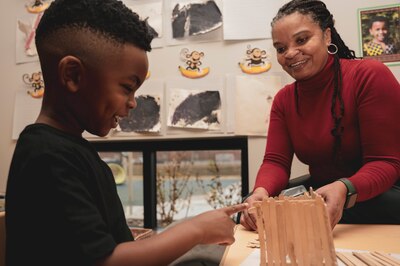Clarissa Odom had her hands — and lap — full when a visitor stopped into her preschool classroom.
Odom, a new infants teacher at a Porter-Leath center in Orange Mound, sat cross-legged on a colorful rug, bouncing two finicky babies looking for snuggles, one on each knee. At the same time, she tried to comfort a crying baby propped up on a boppy pillow in front of her.
The visitor, Nicole Williams, greeted Odom with a cheerful “Good morning!” and without another word, crouched to the floor to help her comfort the crying child. Once the baby calmed down a bit, Williams turned to Odom, smiled, and asked, “How’s everything with the curriculum going?”
Between cuddles, coos, and songs, Odom told Williams about her theme of the week — insects or “creepy crawlers.” Odom reviewed some books she’d read and songs she’d sung to the children so far. Williams suggested an art project: putting paint on the infants’ fingertips to create fingerprint ants. She offered to help Odom find another book, perhaps about spiders.
Williams’ visit on that November day is part of an ambitious effort by Porter-Leath, one of Memphis’ largest providers of preschool services, to professionalize early childhood education and help new teachers become superior educators. As an instructional coach in Porter-Leath’s Teacher Excellence Program, Williams provides teachers with real-time feedback on their instructional methods and student interactions, helps brainstorm new lesson plans or gathers classroom supplies, depending on what the educator needs that day.
A distinguishing feature of the program: Giving teachers a chance to participate in professional development during the school day, while another qualified teacher looks after their students and keeps lessons on track.
Porter-Leath officials hope the program will not only help teachers become better prepared and more effective in the classroom, but also improve educational outcomes for Shelby County’s youngest residents, as Memphis and Tennessee grapple with bleak literacy rates and overall learning loss after the pandemic.
Supporting and investing in early childhood educators is especially important as preschools and early childhood centers struggle to recruit and retain teachers and other staff — a problem that worsened during COVID and continues to wreak havoc on providers in Tennessee and across the nation.
A report from the Center for the Study of Child Care Employment last week found that national child care employment is steadily increasing, but it’s still 8% below what it was in February 2020.
“The workforce itself is depleted,” said Elizabeth Pufall Jones, director of preparation and work environment programs at the research center. “And the solutions and initiatives to fix it are not getting a lot of traction.”
Against that backdrop, Porter-Leath’s Teacher Excellence Program stands out as a model for how other institutions and cities throughout the U.S. can improve teacher quality and morale in the early childhood education profession, and boost student outcomes.
By national standards, Memphis doesn’t have an acute shortage of early childhood education options. But developing high-quality programs has been a persistent challenge across the region’s fragmented network of small and independent child care centers.
So three years ago, Porter-Leath expanded the Teacher Excellence Program beyond its own preschool centers, and now provides coaching and professional development to 23 privately owned child care centers and 13 in-home daycares across the county, as well as First 8 Memphis pre-K. Officials with the nonprofit preschool giant hope to keep the program growing.
Much more still needs to be done to elevate the early childhood education profession and address widespread burnout among teachers and other child care workers, Jones said. The pandemic has fueled conversations about ensuring that early childhood teachers, who face debt burdens from the degrees and certifications they need, earn a living wage.
But a critical piece, Jones said, is having a supportive work environment. Jones has found that providing professional development and real-time coaching to teachers can be a powerful tool to reduce turnover and empower teachers.
“We know that ages 0 to 5 are the most critical and important years for a child’s development and if they’re not properly supported during the first five years, it’s that much harder for a child to recover and progress,” Jones said. “We need to value the work that child care workers do and support them. It’s much more than babysitting.”

Teacher training boosts student literacy
Since launching in 2017, the Teacher Excellence Program has provided hundreds of Memphis early childhood teachers like Odom with professional development opportunities — both through classroom coaching and regular training sessions embedded throughout the school day. Participants come from within Porter-Leath network and the other providers it partners with. Porter-Leath spent about $420,000 on the program in the fiscal year ending in 2019.
“We need to value the work that child care workers do and support them. It’s much more than babysitting.”
A November 2019 study of the program’s impact by an independent consultant found that in the first year, an overwhelming majority of participating teachers said the instructional coaching was “very helpful” and had a large impact on their classroom practices. In turn, students’ pre-literacy skills and kindergarten readiness significantly improved, as measured by assessment scores at the beginning and end of the school year.
The pandemic prevented Porter-Leath from collecting more current data, but Kelley Nichols, vice president of early childhood services, said it’s clear that teachers participating in the program continue to improve — and so do the students.
“The goal is to really just come alongside teachers at any level, meet them where they are, find out what their unique goals are, and help them grow,” Nichols said.
Memphis-Shelby County Schools and state education officials have emphasized improving early childhood education as a way to boost academic results. But MSCS abruptly cut ties with Porter-Leath in June 2021, ending a seven-year partnership in which Porter-Leath provided pre-kindergarten and Head Start services to over 3,000 students.
Even so, the nonprofit remains one of Memphis’ largest providers of early education instruction, and an influential force in workforce training.

Teachers get training — and relief — during the workday
Over the years that Nichols worked in child care centers and school districts, she attended training sessions regularly. But it often meant staying late, long after the school day ended, to attend a session from 5 to 9 p.m. Sometimes it meant coming in on the weekends.
Nichols understood why training couldn’t be held in the middle of the school day — who would take care of her classroom and others? — but those added hours for little or no extra pay in an already demanding field were exhausting.
On top of that, there was often little follow through on the training, Nichols said.
“You would go to a training, you learn stuff, you kind of check a box that you’ve done it, but nobody cared whether you implemented any of it in the classroom,” she said. “There really wasn’t accountability.”
Nichols complains of what she calls the “Monday morning effect” — when something learned over the weekend is forgotten by the next week.
That’s what makes Nichols so passionate about the Teacher Excellence Program she oversees. Though Porter-Leath holds larger professional development conferences a few weekends a year, most of its teacher training occurs during the work day, as in most other professions.
So who watches the children? That’s where the relief teachers come in.
These are not unqualified substitutes. Relief teachers in the Porter-Leath system must have at least two years of experience as an early childhood education classroom teacher, with formalized education or certification in the field, and are expected to continue the teacher’s lesson plan.
“You don’t have to worry about your class,” Nichols said. “A relief teacher will go into your classroom, they’ll teach the regular day’s lessons, meet children where they are, and keep them safe, so the teachers can focus on that training and then take that back into their classroom.”
“We created this program to really respect and honor the profession,” Nichols said.
The instructional coaches visit teachers at least weekly for around two hours at a time. They, too, must be highly qualified, Nichols said — Porter-Leath requires them to have a master’s degree, a minimum of six years of experience as an early childhood classroom teacher, and an ability to train adult learners.
“We created this program to really respect and honor the profession.”
Beyond typical first aid and CPR trainings, professional development provided by Williams and Porter-Leath’s six other instructional coaches centers on topics such as literacy, health, STEAM (science, technology, engineering, art, and math), and social-emotional learning — an especially important focus given many of the children Porter-Leath serves come from Memphis’ poorest neighborhoods and are more likely to struggle academically.

An instructional coach aims to reassure early education teachers
Williams recalls falling in love with early childhood education when she started working at a Memphis daycare at age 17. A self-proclaimed kid at heart, Williams enjoyed the laughter and love that came with playing with children and helping them grow.
But self doubt frequently plagued her in the classroom. Was she interacting with the children the way she should? Was she cut out to be the kind of teacher who set children up for success beyond preschool?
Ultimately, Williams’ passion won out over her doubts. Though she had long planned on studying criminal law, she switched majors during her sophomore year at the University of Memphis. She’s been working in the early childhood profession for over two decades in Shelby County — as a teacher, the director of three child care centers, a state program evaluator tasked with ensuring child care centers meet Tennessee regulations, and a consultant who helped child care providers select developmentally appropriate furniture, toys, and curriculum.
All of those experiences feed into Williams’ work today as an instructional coach at Porter-Leath.
“Every teacher is different, every personality is different. As their advocate, I have to meet them where they are.”
As a teacher, Williams felt that sometimes all she needed was a cheerleader — someone who could reassure her that she was doing OK, even if her lesson plan didn’t turn out exactly the way she had envisioned.
That’s the kind of mentor Williams aims to be for all the teachers she works with, though it looks different from person to person.
“My first goal with my teachers is to build relationships,” Williams said. “Every teacher is different, every personality is different. As their advocate, I have to meet them where they are.”

From curriculum help to nap time: Teachers want extra support
Odom, a new employee at the Porter-Leath & University of Memphis Early Childhood Academy at Orange Mound, is still getting settled in her infant classroom. This is her first job in a larger center. Before this, she largely worked in home daycares.
So for Odom, Williams’ support is more hands on.
During her visit to Odom’s classroom Nov. 16, Williams’ suggestions ranged from how to incorporate Porter-Leath curriculum naturally into the babies’ days, to how to rearrange the cribs, to techniques for comforting an upset baby.
Later that morning, Williams met with Deanna Rayner, a Porter-Leath teacher for nearly a decade.
Rayner beamed with pride as she watched her 13 preschoolers — ages 3 to 5 — shuffle between stations before settling into their new activities. The question of the day was “What do we know about buildings?” and Rayner had students drawing their own buildings in one corner of her classroom, while others constructed buildings with Legos and blocks in other areas.
Keeping the attention of 3-, 4-, and 5-year-olds has become increasingly difficult as children are introduced to technology earlier and earlier, Rayner said.
But that day, as the children moved on to a hands-on group activity mixing dirt and water together to simulate mixing concrete for the foundation of a building, they seemed to have no trouble engaging.

“You’ve got to get more creative in order for them to pick up what we want them to pick up,” Rayner said with a laugh. “We have to work really hard.”
It’s one of many challenges Rayner has had to navigate as an educator. But with the support of Williams and the Teacher Excellence Program over the last five years, Rayner doesn’t feel quite as overwhelmed.
After looking around the classroom and observing Rayner for a while, Williams suggested displaying the question of the day on another spot on the wall and pledged to bring Rayner more chart paper from the supply closet. When Rayner expressed concern over when she’d have time to hang up a new wall display, Williams offered to take care of it herself.
Rayner credits Williams and the program as a whole with helping her become a better teacher.
“She helps us. She is supportive. She comes in here to check on us and makes sure we have everything we need,” Rayner said. Instructional coaches “are that shoulder, that support that we need.”
Having trouble viewing this survey? Go here.
This story is the second installment of a Chalkbeat Tennessee deep dive into the role early childhood can play in improving literacy in Memphis and across the Volunteer State. This effort is supported by the Education Writers Association Reporting Fellowship program.
Samantha West is a reporter for Chalkbeat Tennessee, where she covers K-12 education in Memphis. Connect with Samantha at swest@chalkbeat.org.

